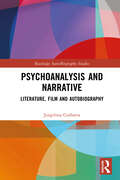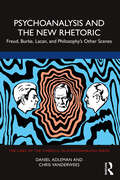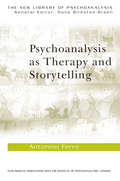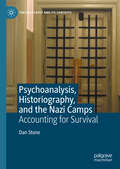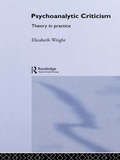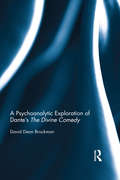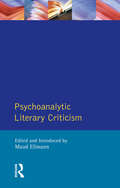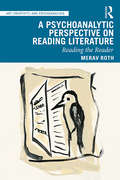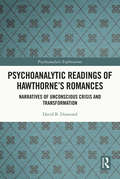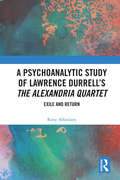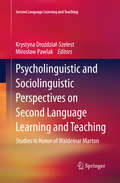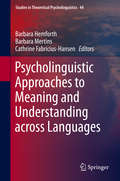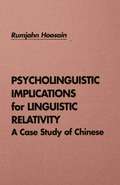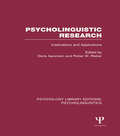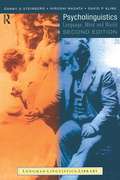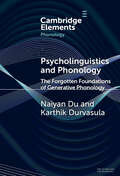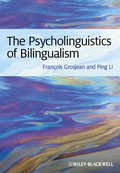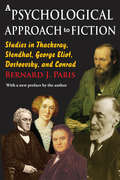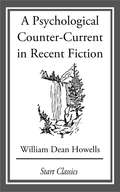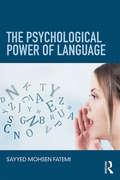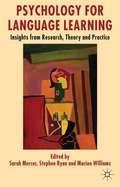- Table View
- List View
Psychoanalysis and Narrative: Literature, Film and Autobiography (ISSN)
by Jorgelina CorbattaPsychoanalysis and Narrative analyzes narrative in literary fiction, film, and autobiography through different psychoanalytic lenses including gender and socio-cultural perspectives. This book aims to demonstrate how fictionists and film makers have intuitively developed – through their own creativity – many of the psychoanalytic discoveries about the human mind. Subverting the usual direction of “applied psychoanalysis,” the book goes from creativity to psychoanalysis, and focuses on four internationally known Argentine writers: Jorge Luis Borges, Julio Cortázar, Manuel Puig, and Luisa Valenzuela; two Argentine women filmmakers, Lucrecia Martel and Lucía Puenzo; and French essayist and writer Serge Doubrovsky. This volume will be of interest to students and academics interested in autobiography and autofiction.
Psychoanalysis and the New Rhetoric: Freud, Burke, Lacan, and Philosophy's Other Scenes (The\lines Of The Symbolic In Psychoanalysis Ser.)
by Daniel Adleman Chris VanderweesPsychoanalysis and the New Rhetoric: Freud, Burke, Lacan, and Philosophy's Other Scenes is an innovative work that places the fields of psychoanalysis and rhetoric in dynamic resonance with one another. The book operates according to a compelling interdisciplinary conceit: Adleman provocatively explores the psychoanalytic aspects of rhetoric and Vanderwees probes the rhetorical dimensions of psychoanalytic practice. This thoroughly researched text takes a closer look at the "missed encounter" between rhetoric and psychoanalysis. The first section of the book explores the massive, but underappreciated, influence of Freudian psychoanalysis on Kenneth Burke’s "new rhetoric." The book’s second section undertakes sustained investigations into the rhetorical dimensions of psychoanalytic concepts such as transference, free association, and listening. Psychoanalysis and the New Rhetoric then culminates in a more comprehensive discussion of Lacanian psychoanalysis in the context of Kenneth Burke’s new rhetoric. The book therefore serves as an invaluable aperture to the fields of psychoanalysis and rhetoric, including their much overlooked disciplinary entanglement. Psychoanalysis and the New Rhetoric will be of great interest to scholars of psychoanalytic studies, rhetoric, language studies, semiotics, media studies, and communication studies.
Psychoanalysis as Therapy and Storytelling (The New Library of Psychoanalysis)
by Antonino FerroIs psychoanalysis a type of literature? Can telling 'stories' help us to get at the truth? Psychoanalysis as Therapy and Storytelling examines psychoanalysis from two perspectives - as a cure for psychic suffering, and as a series of stories told between patient and analyst. Antonino Ferro uses numerous clinical examples to investigate how narration and interpretation are interconnected in the analytic session. He draws on and develops Bion's theories to present a novel perspective on subjects such as: psychoanalysis as a particular form of literature sexuality as a narrative genre or dialect in the analyst's consulting room delusion and hallucination acting out, the countertransference and the transgenerational field play: characters, narrations and interpretations. Psychoanalytic clinicians and theoreticians alike will find the innovative approach to the analytic session described here of great interest. Winner of the 2007 Sigourney Award.
Psychoanalysis, Historiography, and the Nazi Camps: Accounting for Survival (The Holocaust and its Contexts)
by Dan StoneIn the postwar years, Dutch survivors Eddy de Wind, Louis Micheels, and Elie A. Cohen, who went on to become practicing psychoanalysts, penned accounts of their survival of the Nazi camps. Their sober assessments contrast sharply with those by Bruno Bettelheim and Viktor Frankl, which emphasized decisiveness, 'positive thinking', and resistance, missing the fact that many Holocaust victims with those characteristics or other qualities did not survive. De Wind’s, Micheels’ and Cohen’s accounts are more sober, (self-)critical, and shaped by analytical practice. By analyzing them anew and comparing them with accounts by female doctors who survived Block 10 in Auschwitz, this book argues that their theories of survival accord with contemporary sensibilities in psychoanalysis and Holocaust historiography. Psychoanalytic concepts have changed over time in response to greater understanding of the Holocaust and recent Holocaust historiography makes us more receptive to insights that were unfashionable in the first postwar decades.
Psychoanalytic Criticism: A Reappraisal (New Accents Ser.)
by Elizabeth WrightFirst published in 2002. Routledge is an imprint of Taylor & Francis, an informa company.
A Psychoanalytic Exploration of Dante's The Divine Comedy
by David Dean BrockmanDavid Dean Brockman connects spirituality with psychoanalysis throughout this book as he looks at Dante’s early writings, his life story and his "polysemous" classical poem The Divine Comedy. Dante wanted to create a document that would educate the common man about his journey from brokenness to growth and a solid integration of body, self, and soul. This book draws the resemblance between Dante’s poem and the "journey" that patients experience in psychoanalytic therapy. It will be the first total treatment of Dante’s work in general, and The Divine Comedy in particular, using the psychoanalytic method. This fascinating study of Dante’s The Divine Comedy will be of interest to psychoanalysts, psychotherapists, and psychiatrists, as well as those still in training. Academics and students of psychology, spirituality, religion, and literature may also be interested in Brockman’s in-depth study of Dante’s work.
Psychoanalytic Literary Criticism (Longman Critical Readers)
by Maud EllmannThis collection of essays provides students of literary critical theory with an introduction to Freudian methods of interpretation, and shows how those methods have been transformed by recent developments in French psychoanalysis, particularly by the influence of Jacques Lacan. It explains how classical Freudian criticism tended to focus on the thematic content of the literary text, whereas Lacanian criticism focuses on its linguistic structure, redirecting the reader to the words themselves. Concepts and methods are defined by tracing the role played by the drama of Oedipus in the development of psychoanalytic theory and criticism. The essays cover a wide generic scope and are divided into three parts: drama, narrative and poetry. Each is accompanied by explanatory headnotes giving clear definitions of complex terms.
A Psychoanalytic Perspective on Reading Literature: Reading the Reader (Art, Creativity, and Psychoanalysis Book Series)
by Merav RothWhat are the unconscious processes involved in reading literature? How does literature influence our psychological development and existential challenges? A Psychoanalytic Perspective on Reading Literature offers a unique glimpse into the unconscious psychic processes and development involved in reading. The author listens to the 'free associations' of various literary characters, in numerous scenarios where the characters are themselves reading literature, thus revealing the mysterious ways in which reading literature helps us and contributes to our development. The book offers an introduction both to classic literature (Poe, Proust, Sartre, Semprún, Pessoa, Agnon and more) and to the major psychoanalytic concepts that can be used in reading it – all described and widely explained before being used as tools for interpreting the literary illustrations. The book thus offers a rich lexical psychoanalytic source, alongside its main aim in analysing the reader’s psychological mechanisms and development. Psychoanalytic interpretation of those literary readers opens three main avenues to the reader’s experience: the transference relations toward the literary characters; the literary work as means to transcend beyond the reader’s self-identity and existential boundaries; and mobilization of internal dialectic tensions towards new integration and psychic equilibrium. An Epilogue concludes by emphasising the transformational power embedded in reading literature. The fascinating dialogue between literature and psychoanalysis illuminates hitherto concealed aspects of each discipline and contributes to new insights in both fields. A Psychoanalytic Perspective on Reading Literature will be of great interest not only to psychoanalytic-psychotherapists and literature scholars, but also to a wider readership beyond these areas of study.
Psychoanalytic Readings of Hawthorne’s Romances: Narratives of Unconscious Crisis and Transformation (Psychoanalytic Explorations)
by David B. DiamondOffering innovative, psychoanalytic readings of Nathaniel Hawthorne’s four romances, this volume systematically applies Freudian theory to present significant new insights into the psychology of Hawthorne’s characters and their fates. By critically examining scenes in which the protagonists confront past traumas, Diamond underscores the transformative potential which Hawthorne attributes to encounters with the unconscious. Psychoanalytic narrative technique is employed to interpret the psychogical crises, all hidden by Hawthorne in narrative gaps, in The Scarlet Letter, The House of the Seven Gables, The Blithedale Romance, and The Marble Faun. The protagonists' transformations that are illuminated are crucial to an understanding of the trajectory and resolution of the romances. The text will benefit both academic and non-academic readers who seek a deeper understanding of the psychology of Hawthorne's romances. It will be of particular interest to educators and researchers of applied psychoanalysis and psychoanalytic technique. Since its conclusions challenge many currently held critical views, this volume is especially relevant to scholars of Hawthorne studies, interdisciplinary literary studies, and 19th century American literature.
A Psychoanalytic Study of Lawrence Durrell’s The Alexandria Quartet: Exile and Return
by Rony AlfandaryA Psychoanalytic Study of Lawrence Durrell’s The Alexandria Quartet: Exile and Return focuses on the dialogue created by literature and psychoanalysis in an individual’s quest to explore existential issues, such as a sense of belonging to a homeland and a recurring sense of the Uncanny (das unheimliche). Rony Alfandary explores Durrell’s attempt to recreate a sense of belonging to a homeland, which perhaps never existed but can be retraced and reinvented through writing. This book studies some issues present in Durrell’s work: the connection between biographical and fictional elements in the study of literature the influence of early Freudian theoretical themes upon the writer later influences including post-modern and hermeneutic theories The life and work of Lawrence Durrell can serve as a prototype of a man’s quest for meaning, in a world caught in turmoil in the period between and during WW2. The author’s psychoanalytic exploration of the work and its relevance to human experience today, shows how the themes Durrell dealt with remain relevant. Alfandary highlights the ways in which his usage of several author narrative styles exemplifies the divergent and often contradictory nature of "Truth", emerging rather as multi-layered, multi-voiced and often torn sense of human subjectivity. A Psychoanalytic Study of Lawrence Durrell’s The Alexandria Quartet: Exile and Return demonstrates Durrell’s strong influence by psychoanalytic thought and will appeal to both psychoanalytic and literary scholars.
Psycholinguistic and Sociolinguistic Perspectives on Second Language Learning and Teaching
by Mirosław Pawlak Krystyna Drozdzial-SzelestThe volume provides a state-of-the-art overview of key issues in second language learning and teaching, adopting as a point of reference both psycholinguistic and sociolinguistic perspectives. The papers included in the collection, which have been contributed by leading specialists in the field from Poland and abroad, touch upon important theoretical issues, report latest research findings and offer guidelines for classroom practice. The range of topics covered and the inclusion of concrete pedagogic proposals ensures that the book will be of interest to a wide audience, not only SLA specialists, but also methodologists, material designers, undergraduate and graduate students, and practitioners
Psycholinguistic Approaches to Meaning and Understanding across Languages
by Barbara Hemforth Barbara Mertins Cathrine Fabricius-HansenReports on joint work by researchers from different theoretical and linguistic backgrounds offer new insights on the interaction of linguistic code and context in language production and comprehension. This volume takes a genuinely cross-linguistic approach integrating theoretically well-founded contrastive descriptions with thorough empirical investigations. Authors answer questions on the topic of how we 'encode' complex thoughts into linguistic signals and how we interpret such signals in appropriate ways Chapters combine on- and off-line empirical methods varying from large-scale corpus analyses over acceptability judgements, sentence completion studies and reading time experiments. The authors shed new light on the central questions related to our everyday use of language, especially the problem of how we construe meaning in and through language in general as well as through the means provided by particular languages.
Psycholinguistic Implications for Linguistic Relativity: A Case Study of Chinese
by Rumjahn HoosainRather than offering variations in "world view" as evidence for linguistic relativity, this book views language related differences in terms of the facility with which information is processed. Distinctive perceptual, memory, and neurolinguistic aspects of the Chinese language are discussed, as is the cognitive style of the Chinese people. Chinese orthography and other features of morphology and syntax are examined in relation to both bottom-up and top-down cognitive processes. While providing an extensive review of the experimental literature published in English on the Chinese language, this volume also offers a significant sample of the literature originally published in Chinese.
Psycholinguistic Research: Implications and Applications (Psychology Library Editions: Psycholinguistics)
by Doris Aaronson Robert W. RieberOriginally published in 1979, this book represents an effort to bring together the two disciplines at the core of psycholinguistics, psychology and linguistics. It discusses a broad variety of theoretical approaches to psycholinguistics as well as covering a wide range of topics. At the time the book had four goals: to discuss many of the important contemporary issues in psycholinguistics; to explore the different views on major theoretical controversies; to provide an analysis of background literature as a framework in which to evaluate the issues and controversies; and to describe interesting high-quality research currently being done by the authors and some of their colleagues. Today it can be read and enjoyed in its historical context, with many of the chapters still relevant in psycholinguistic research today.
Psycholinguistics: Central Topics
by Alan GarnhamFrom the author: This book reflects my beliefs about how psycholinguistics, and cognitive psychology in general, should be taught. Since psycholinguistics is a scientific discipline, the book discusses theories about the central cognitive aspects of language understanding, rather than presenting a morass of unstructured facts on a series of loosely connected topics. It also attempts to reflect the emergence of cognitive science, an interdisciplinary approach to the study of language and other cognitive processes. It describes not only psychological studies, but also ideas from linguistics, artificial intelligence, the philosophy of language and formal logic. There is no pretence that the discussion is exhaustive.
Psycholinguistics: Language, Mind and World (Longman Linguistics Library)
by Danny D. Steinberg Hiroshi Nagata David P. AlineHow do we learn to produce and comprehend speech? How does language relate to thought?This second edition of the successful text Psycholinguistics- Language, Mind and World considers the psychology of language as it relates to learning, mind and brain as well as various aspects of society and culture. Current issues and research topics are presented in an in-depth manner, although little or no specific knowledge of any topic is presupposed.The book is divided into four main parts: First Language Learning Second Language Learning Language, Mind and Brain Mental Grammar and Language Processing These four sections include chapters covering areas such as- deaf language education, first language acquisition and first language reading, second language acquisition, language teaching and the problems of bilingualism.Updated throughout, this new edition also considers and proposes new theories in psycholinguistics and linguistics, and introduces a new theory of grammar, Natural Grammar, which is the only current grammar that is based on the primacy of the psycholinguistic process of speech comprehension, derives speech production from that process. Written in an accessible and fluent style, Psycholinguistics- Language, Mind and World will be of interest to students, lecturers and researchers from linguistics, psychology, philosophy and second language teaching.
Psycholinguistics and Phonology: The Forgotten Foundations of Generative Phonology (Elements in Phonology)
by Naiyan Du Karthik DurvasulaResearch over the last few decades has consistently questioned the sufficiency of abstract/ discrete phonological representations based on putative misalignments between predictions from such representations and observed experimental results. The authors first suggest that many of the arguments ride on misunderstandings of the original claims from generative phonology, and that the typical evidence furnished is consistent with those claims. They then focus in on the phenomenon of incomplete neutralisation and show that it is consistent with the classic generative phonology view. The authors further point out that extant accounts of the phenomenon do not achieve important desiderata and typically do not provide an explanation for either the phenomenon itself, or why there are actually at least two different kinds of incomplete neutralisation that don't stem from task confounds. Finally, they present new experimental data and explain that the phenomenon is an outcome of planning using abstract/discrete phonological knowledge.
The Psycholinguistics of Bilingualism
by François Grosjean Ping LiThe Psycholinguistics of Bilingualism presents a comprehensive introduction to the foundations of bilingualism, covering language processing, language acquisition, cognition and the bilingual brain. This thorough introduction to the psycholinguistics of bilingualism is accessible to non-specialists with little previous exposure to the field Introduces students to the methodological approaches currently employed in the field, including observation, experimentation, verbal and computational modelling, and brain imaging Examines spoken and written language processing, simultaneous and successive language acquisition, bilingual memory and cognitive effects, and neurolinguistic and neuro-computational models of the bilingual brain Written in an accessible style by two of the field’s leading researchers, together with contributions from internationally-renowned scholars Featuring chapter-by-chapter research questions, this is an essential resource for those seeking insights into the bilingual mind and our current knowledge of the cognitive basis of bilingualism
A Psychological Approach to Fiction: Studies in Thackeray, Stendhal, George Eliot, Dostoevsky, and Conrad
by Bernard J. Paris"Psychology helps us to talk about what the novelist knows, but fiction helps us to know what the psychologist is talking about." So writes the author of this brilliant study. The chief impulse of realistic fiction is mimetic; novels of psychological realism call by their very nature for psychological analysis. This study uses psychology to analyze important characters and to explore the consciousness of the author and the work as a whole. What is needed for the interpretation of realistic fiction is a psychological theory congruent with the experience portrayed. Emerging from Paris' approach are wholly new and illuminating interpretations of Becky Sharp, William Dobbin, Amelia Sedley, Julien Sorel, Madame de Renal, Mathilde de la Mole, Maggie Tulliver, the underground man, Charley Marlow, and Lord Jim. The psychological approach employed by Paris helps the reader not only to grasp the intricacies of mimetic characterization, but also to make sense of thematic inconsistencies which occur in some of the books under consideration. For students of human behavior as well as students of literature, the great figures of realistic fiction provide a rich source of empathic understanding and psychological insight.
A Psychological Counter-Current in Recent Fiction
by William Dean HowellsIt is consoling as often as dismaying to find in what seems a cataclysmal tide of a certain direction a strong drift to the opposite quarter. It is so divinable, if not so perceptible, that its presence may usually be recognized as a beginning of the turn in every tide which is sure, sooner or later, to come. In reform, it is the menace of reaction; in reaction, it is the promise of reform; we may take heart as we must lose heart from it. A few years ago, when a movement which carried fiction to the highest place in literature was apparently of such onward and upward sweep that there could be no return or descent, there was a counter-current in it which stayed it at last, and pulled it back to that lamentable level where fiction is now sunk, and the word "novel" is again the synonym of all that is morally false and mentally despicable.
The Psychological Power of Language
by Sayyed Mohsen FatemiThis volume shows how the psychology and power of language can create realities. It examines the psychological implications of language as a way of being and not just as an instrument of communication. It discusses how a shift in language gives rise to an existential transformation, and shows how creative modes of expression lead to a radical transformation of beings. Throughout, both the theoretical and practical implications of the psychological power of language are presented, particularly how language may result in a healthier inter- and intrapersonal world. It will interest upper-level students and researchers of language in Psychology, Linguistics, Philosophy and Education, as well as professional counselors.
The Psychologist’s Companion
by Sternberg Robert J. Karin SternbergThe Psychologist's Companion is intended for students as well as young professionals and writers at all stages of their careers seeking inspiration and guidelines for better scientific writing. This book is also a resource for researchers in related fields. It has been comprehensively updated, revised, and extended for its fifth edition and includes the latest style guidelines of the American Psychological Association's Publication Manual (sixth edition, 2009) as well as chapters encompassing the entire research process from doing literature research and planning an experiment to writing the paper. It features new chapters on literature research; ethics; and generating, evaluating, and selling ideas. The Psychologist's Companion also provides information on writing book proposals, grant proposals, and lectures.
The Psychologist's Companion
by Robert J. Sternberg Karin SternbergThe Psychologist's Companion is intended for students as well as young professionals and writers at all stages of their careers seeking inspiration and guidelines for better scientific writing. This book is also a resource for researchers in related fields. It has been comprehensively updated, revised, and extended for its fifth edition and includes the latest style guidelines of the American Psychological Association's Publication Manual (sixth edition, 2009) as well as chapters encompassing the entire research process from doing literature research and planning an experiment to writing the paper. It features new chapters on literature research; ethics; and generating, evaluating, and selling ideas. The Psychologist's Companion also provides information on writing book proposals, grant proposals, and lectures.
Psychology and History
by Cristian Tileagă Jovan ByfordAs disciplines, psychology and history share a primary concern with the human condition. Yet historically, the relationship between the two fields has been uneasy, marked by a long-standing climate of mutual suspicion. This book engages with the history of this relationship and possibilities for its future intellectual and empirical development. Bringing together internationally renowned psychologists and historians, it explores the ways in which the two disciplines could benefit from a closer dialogue. Thirteen chapters span a broad range of topics, including social memory, prejudice, stereotyping, affect and emotion, cognition, personality, gender and the self. Contributors draw on examples from different cultural contexts - from eighteenth-century Britain, to apartheid South Africa, to conflict-torn Yugoslavia - to offer fresh impetus to interdisciplinary scholarship. Generating new ideas, research questions and problems, this book encourages researchers to engage in genuine dialogue and place their own explorations in new intellectual contexts.
Psychology for Language Learning
by Sarah Mercer Stephen Ryan Marion WilliamsOffering a timely snapshot of current theory and research in the field of psychology in foreign language learning, this book is accessible to both specialists and non-specialists. Each chapter focuses on a different psychological construct and provides an overview of current thinking in the area drawing on insights from educational psychology.
